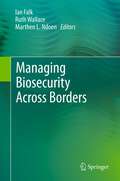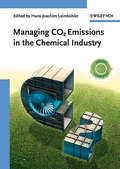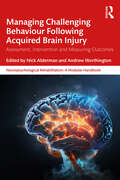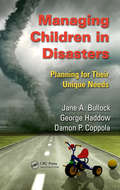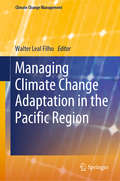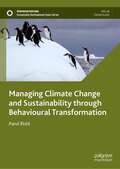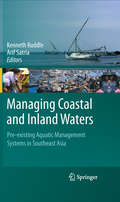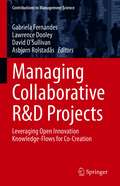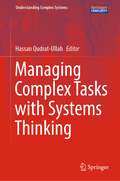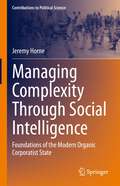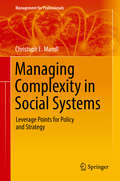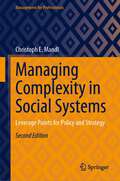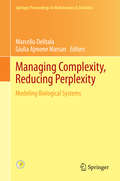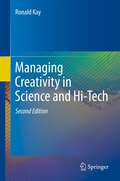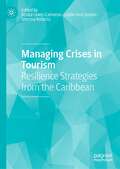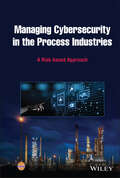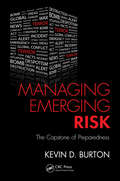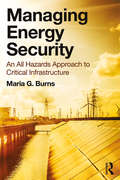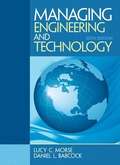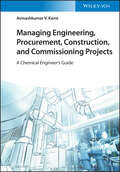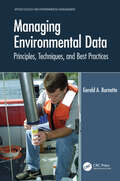- Table View
- List View
Managing Biosecurity Across Borders
by Ian Falk Ruth Wallace Marthen L. NdoenManaging biosecurity is everybody's business. The book's multi-site, multi-sectoral research contributes to an holistic, evidence-based strategy for managing plant biosecurity in complex contexts. The intent is to provide a starting point for all stakeholders in the biosecurity endeavor - policy personnel at all levels of governance, planners and regional developers, non-government organizations, community groups and individuals - to plan localized strategies that 'fit' national needs and constraints and the way people live their lives. In putting forward a 'strategy', we draw on many disciplines and cultural perspectives on a problem that is fundamentally a multidisciplinary and global issue. At the same time, the contributing researchers remain aware that such a strategy is always subject to local contextual factors and influences, indigenous and local knowledge and culture, and is regarded as a tool for planning, always subject to change.
Managing CO2 Emissions in the Chemical Industry
by Hans-Joachim LeimkühlerThis unrivaled reference and handbook on this hot topic covers the technical and administrative aspects of CO2 emissions, with special reference to the chemical and petrochemical industry. It also discusses energy efficient design, cultural aspects and future developments, answering such questions along the way as:- How can I measure and demonstrate the CO2 emissions linked to my production?- How can I benefit from CO2 neutral investments using the UNFCCC frame?- How can I reduce or avoid CO2 emissions by technical measures and new processes?- If CO2 emissions cannot be avoided, how is the capture and storage of CO2 technically and economically feasible?- What are the upcoming technical developments regarding CO2 reduction?A highly useful, practical and essential information source on one of the most pressing environmental topics of our times.
Managing Challenging Behaviour Following Acquired Brain Injury: Assessment, Intervention and Measuring Outcomes (Neuropsychological Rehabilitation: A Modular Handbook)
by Andrew Worthington Nick AldermanThis empirically based book provides conceptual knowledge and practical advice to enable clinicians to implement evidence-based methods drawn from learning theory for managing the catastrophic effects of challenging behaviour as an enduring outcome of acquired brain injury (ABI). Based on a conceptual framework of neurobehavioural disability, the book takes a holistic case formulation approach, incorporating functional assessment procedures arising from the operant learning tradition that underpins the design of treatment interventions. It bridges the knowledge gap in uniquely providing a single resource to enable practitioners to implement evidence-based methods to better manage ABI behaviour disorders. The authors, who are leading experts in the field, have described a model of intervention based on a functional analytic approach to understanding behaviour within an operant learning framework. The chapters provide a step-by-step approach to assessment, formulation, intervention and evaluation of behaviour support plans, and feature examples for specific challenging behaviours in a variety of different contexts. The book is organised to support the use of this model through expert contributions concerning the origins of challenging behaviour, assessment methods and formulation, and interventions. The practical orientation of this book makes it an indispensable read for neuropsychologists, clinical psychologists and other rehabilitation specialists involved in the care of people with ABI as well as researchers in these fields.
Managing Children in Disasters: Planning for Their Unique Needs
by Damon P. Coppola George Haddow Jane A. BullockEach year, disasters such as house fires, car accidents, tsunamis, earthquakes, and hurricanes impact hundreds of thousands of children. Child victims can suffer disproportionately and the physical and psychological damage sustained can far outweigh the same effects in adults, often requiring years of therapy. Sadly, emergency planners to date have
Managing Climate Change Adaptation in the Pacific Region (Climate Change Management)
by Walter Leal FilhoThis book presents papers written by scholars, practitioners, and members of social movements and government agencies pursuing research and/or climate change projects in the Pacific region. Climate change is impacting the Pacific in various ways, including numerous negative effects on the natural environment and biodiversity. As such, a better understanding of how climate change affects Pacific communities is required, in order to identify processes, methods, and tools that can help countries and the communities in the region to adapt and become more resilient. Further, the book showcases successful examples of how to cope with the social, economic, and political problems posed by climate change in the region.
Managing Climate Change and Sustainability through Behavioural Transformation (Sustainable Development Goals Series)
by Parul RishiThis book addresses climate change and sustainability management from a transdisciplinary perspective which encompasses within itself how different humanistic disciplines can culminate with each other to move ahead with the agenda. Issues of adapting to climate change and sustainability management have been gaining global prominence over the past few decades. There have also been volumes of literature that highlight the technical dimensions of climate change and sustainability across regions and cultures. However, they have had limited strength to bring direct and desirable impact in promoting pro-climate action and sustainability behaviour. The major reason for this is limited inclusion of pluralistic perspectives into human cognition and affect, and resultant limited public acceptability. Although behavioural science as a discipline has taken a front seat in promoting behavioural transformation, the book argues that other humanistic fields of understanding like education, art, literature, philosophy, political science, sociology, economics, etc., have to be integrated in order to present a holistic standpoint to sustainability literature.
Managing Coastal and Inland Waters
by Arif Satria Kenneth RuddleBesides the erroneous assumption that tropical fisheries are 'open access', the cases demonstrate that pre-existing systems (1) are concerned with the community of fishers and ensuring community harmony and continuity; (2) involve flexible, multiple and overlapping rights adapted to changing needs and circumstances; (3) that fisheries are just one component of a community resource assemblage and depend on both the good management of linked upstream ecosystems and risk management to ensure balanced nutritional resources of the community; and (4) pre-existing systems are greatly affected by a constellation of interacting external pressures.
Managing Collaborative R&D Projects: Leveraging Open Innovation Knowledge-Flows for Co-Creation (Contributions to Management Science)
by Asbjørn Rolstadås Lawrence Dooley David O’Sullivan Gabriela FernandesCollaboration among industry, universities and research institutes plays a vital role in stimulating open innovation, which in turn leads to new products, processes, services and business models. This book brings together a number of real-life examples of how to govern and manage open innovation collaboration projects more effectively, and provides timely insights that project consortia, governance boards and funding agencies can directly apply to implement and monitor projects and achieve greater impacts. All papers were written by recognized leading authorities with extensive experience in governance and management, and reveal how to capitalize on the potential of open innovation.This book shares multidisciplinary research perspectives on the potential benefits and challenges of collaboration, project management, and open innovation, as well as the management of complex organizational cultures and governance models.
Managing Complex Tasks with Systems Thinking (Understanding Complex Systems)
by Hassan Qudrat-UllahThis book is about improving human decision making and performance in complex tasks. Utilizing systems thinking approach, this book presents innovative and insightful solutions to various managerial issues in various domains including agriculture, education, climate change, digital transformation, health care, supply chains, and sustainability. Practical insights and operational causal models are systematically presented. The key features of the didactic approach of this book are core knowledge, numerous tables and figures throughout the text, system archetypes, and causal loop models. This book serves as a text for college and university courses on Systems Thinking for Management Decision Making in Complex Tasks. Researchers use the developed “causal models” to design and evaluate various decision-aiding technologies. It is used as a source of practical information for a broad community of decision-makers, researchers, and practitioners concerned with the issue of improving human performance in complex organizational tasks.
Managing Complexity Through Social Intelligence: Foundations of the Modern Organic Corporatist State (Contributions to Political Science)
by Jeremy HorneThis book presents solutions to problems that are total and based on thinking about how and why humans have organized themselves. It discusses how to avoid the now well-documented Holocene Extinction, propelled by climate change, wars, resource depletion, desertification, degrading knowledge quality, famine, and deterioration of societies overall. It explains why we cannot respond effectively with hedonistic, incompetent, corrupt, and anarchistic "liberal democracy" and why neither personality cult regimes can suffice. The book offers a model of an organic social structure embodying a collective consciousness of communitarianism and Platonic-style ethos. Putting an emphasis on the re-establishment of Classical Greek virtue, it offers solutions to resolve identity politics, alienation, and meritocracy. While doing so, the author opposes the "everyone is equal" ideology to govern the section of policymakers, instead circumscribing "rights" in terms of responsibilities, prioritizing education and training to carry forth the ethos of valuing truth above materialism, and developing Durkheim's social brain via a new discipline, "sociointelligence". The book goes on to explain how underpinning these elements is a comprehensive elucidation of often misunderstood words like "liberty", "freedom", "authoritarianism", and "democracy". All of these areas are arranged and combined in uniquely describing the organic society the author deems necessary to avoid human extinction. As a result, the book presents a “new organicity”, where the emerging transhumanism seeks to transcend hydrocarbon-based life with humanly-constructed life.This book will appeal to students, researchers, and scholars of political science, philosophy, and the social sciences interested in a better understanding of complexity, democratic theory, Holocene Extinction, organic thinking, and meritocratic societies.
Managing Complexity in Social Systems: Leverage Points for Policy and Strategy (Management for Professionals)
by Christoph E. MandlWhy do policies and strategies often fail, and what can be done about it? How can complexity be managed in cases where it cannot be reduced? The answers to these questions are anything but trivial, and can only be found by combining insights from complexity science, system dynamics, system theory and systems thinking. Rooted in the seminal works of Gregory Bateson, Jay Forrester, Donella Meadows, Peter Senge, W. Brian Arthur, John Sterman and Thomas Schelling, this book bridges the gap between rigorous science and real-life experience to explore the potential and limitations of leverage points in implementing policies and strategies. It also presents diagnostic tools to help recognize system archetypes, as well as the powerful language of stock and flow diagrams, which allows us to think in terms of circular causality. These tools are subsequently employed to thoroughly analyze particularly thorny problems such as global climate change, the tragedy of the commons, path dependence, diffusion of innovations, and exponential growth of inequality.
Managing Complexity in Social Systems: Leverage Points for Policy and Strategy (Management for Professionals)
by Christoph E. MandlThis book explores how to manage complexity in a highly interconnected world. How can complexity be managed when it cannot be reduced? From organizational addiction to market failure, from limits to growth to the rebound effect, from tragedy of the commons to path dependence, answers are anything but trivial, and can only be found by combining insights from complexity science, system dynamics, system theory and systems thinking. This book bridges the gap between rigorous science and real-life experience to explore the potential and limitations of systems archetypes and their leverage points in implementing effective policies and strategies. It is grounded in Jay Forrester’s language of stock and flow diagrams to address issues of circular causality and causal loops in social systems.The second edition has been completely updated, revised, and extended to thoroughly analyze super wicked problems such as global climate change, climate neutrality, and extremely rapid spread of epidemics. Furthermore, it offers a novel integration of Peter Senge’s concept of systems archetypes with Horst Rittel’s concept of wicked problems. “This text is an important contribution to an emerging field of thought. I have enjoyed and benefitted from reading this text; you will also.”Dennis L. Meadows, Emeritus Professor of Systems Management, University of New Hampshire, USA“This book looks at the world from a different, yet very effective vantage point: the systemic perspective… The author delivers a perfect introduction to systemic thinking, – unorthodox, insightful and practical.” Markus Schwaninger, Emeritus Professor of Management, University of St.Gallen, Switzerland
Managing Complexity, Reducing Perplexity
by Giulia Ajmone Marsan Marcello Delitala"Managing Complexity, Reducing Perplexity" is devoted to an overview of the status of the art in the study of complex systems, with particular focus on the analysis of systems pertaining to living matter. Both senior scientists and young researchers from diverse and prestigious institutions with a deliberately interdisciplinary cut were invited, in order to compare approaches and problems from different disciplines. The common aim of the contributions was to analyze the complexity of living systems by means of new mathematical paradigms that are more adherent to reality and which are able to generate both exploratory and predictive models that are capable of achieving a deeper insight into life science phenomena.
Managing Creativity in Science and Hi-Tech
by Ronald KayAddressing the issues unique to managers of creative technical staff, this guide reflects not only Ronald Kay's long experience observing and teaching successful management techniques, but also treats the expanding challenges due to increasingly globally-based projects and staff. As before, Kay's guide helps readers to prepare themselves, graduate students and others to understand and improve their managerial skills and covers such practical, yet sometimes overlooked, steps such as: individual and team behavior of creative technical staff; managing their own and others' R&D projects; hiring, evaluating and compensating technical staff; R&D proposals and administrative functions; and presentations, meetings and organizational culture. New to this edition are a chapter on the global impact of high-tech enterprises and sections on the roles of foundations and government funding and task-force participation. Also tackled are the basics of starting, financing and staffing venture-capital-funded enterprises. What's more, this book also serves to increase the awareness and knowledge base of anyone who needs to meet the challenge of managing people with the creative energies that drive technologically-based economic growth.
Managing Crises in Tourism: Resilience Strategies from the Caribbean
by Acolla Lewis-Cameron Sherma Roberts Leslie-Ann JordanThis book examines the dilemma of overdependence on tourism in Caribbean countries and territories, and the need for a resilient path to address the industry’s vulnerability in the face of natural disasters. The chapters in the book question how tourism resilience is understood and practiced in Caribbean small island developing states (SIDS) and the factors that inform, undermine, or indeed redefine the sustainable resilience agenda for these territories.With its overreliance on tourism and vulnerability to climate, the Caribbean region finds itself susceptible and in need of an innovative approach in order to survive economically. Contributors to this volume touch on all three sustainability pillars and spanning across many tourism sector considerations, such as product development, stakeholder management, hotel management, marketing and entrepreneurship. By spanning the geography of the Anglophone and Spanish Caribbean this book offers a smorgasbord of conceptual and applied perspectives to researchers in the area of tourism resilience in SIDS. It also presents strategic considerations to public and private sector practitioners in implementing measures to strengthen the competitive positioning of their destinations as they contend with the dynamism of the external and internal environments.
Managing Cyber Attacks in International Law, Business, and Relations
by Jd Scott J. ShackelfordThis book presents a framework to reconceptualize internet governance and better manage cyber attacks. It examines the potential of polycentric regulation to increase accountability through bottom-up action. It also provides a synthesis of the current state of cybersecurity research, bringing features of cyber attacks to light and comparing and contrasting the threat to all relevant stakeholders. Throughout the book, cybersecurity is treated holistically, covering issues in law, science, economics and politics. This interdisciplinary approach is an exemplar of how strategies from different disciplines as well as the private and public sectors may cross-pollinate to enhance cybersecurity. Case studies and examples illustrate what is at stake and identify best practices. The book discusses technical issues of Internet governance and cybersecurity while presenting the material in an informal, straightforward manner. The book is designed to inform readers about the interplay of Internet governance and cybersecurity and the potential of polycentric regulation to help foster cyber peace.
Managing Cybersecurity in the Process Industries: A Risk-based Approach
by CCPS (Center for Chemical Process Safety)The chemical process industry is a rich target for cyber attackers who are intent on causing harm. Current risk management techniques are based on the premise that events are initiated by a single failure and the succeeding sequence of events is predictable. A cyberattack on the Safety, Controls, Alarms, and Interlocks (SCAI) undermines this basic assumption. Each facility should have a Cybersecurity Policy, Implementation Plan and Threat Response Plan in place. The response plan should address how to bring the process to a safe state when controls and safety systems are compromised. The emergency response plan should be updated to reflect different actions that may be appropriate in a sabotage situation. IT professionals, even those working at chemical facilities are primarily focused on the risk to business systems. This book contains guidelines for companies on how to improve their process safety performance by applying Risk Based Process Safety (RBPS) concepts and techniques to the problem of cybersecurity.
Managing Emerging Risk: The Capstone of Preparedness
by Kevin D. BurtonFrom Main Street to Mumbai, Managing Emerging Risk: The Capstone of Preparedness considers the new global drivers behind threats and hazards facing all those tasked with protecting the public and private sector. The text delves into the global mindset of public and private sector emergency managers and presents a new risk landscape vastly different from the one existing ten years ago.The book begins by presenting a series of fictitious scenarios each resulting in mass destruction and fatalities. These are each followed by actual news stories that support the scenarios and demonstrate that the proposed events‘seemingly unthinkable have the potential to occur. Next, the author identifies two drivers in the practice of emergency management and general preparedness today that constitute our view of the future and the new face of risk. The first is the Disaster Halo Effectthe idea that modern threats exhibit more than one event. The second is the worldview of our nation as a Market State focused on the trading of goods, services, and ideas among the nation-states. The book also reviews the history of preparedness and discusses its relationship with large-scale threats, establishing that hindsight bias has hurt our ability to plan and respond to the unexpected.The chapters that follow explore what is needed to better cultivate, design, develop, and operate emerging management and preparedness thinking in the current environment. Each chapter begins with key terms and objectives and ends with thought-provoking questions. Introducing a new paradigm of thought that takes into account the chief influencers of global threats, the book arms emergency and business operations managers with the ammo needed to successfully confront emerging threats in the 21st century.
Managing Energy Security: An All Hazards Approach to Critical Infrastructure
by Maria G. BurnsThis interdisciplinary book is written for government and industry professionals who need a comprehensive, accessible guide to modern energy security. Introducing the ten predominant energy types, both renewable and non-renewable, the book illustrates the modern energy landscape from a geopolitical, commercial, economic and technological perspective. Energy is presented as the powerhouse of global economic activities. To ensure the uninterrupted supply of energy, nations, industries and consumers need to have options. Efficient energy security planning ensures that when a primary energy source is depleted, compromised or interrupted, an alternative energy source must be readily available. For this reason, the foundations of energy security are built upon the five pillars of Sustainability, Independence, Efficiency, Affordability and Accessibility. The numerous case studies presented in this book demonstrate that energy security may be compromised in the absence of one out of these five ingredients. The book also entertains the Triple-E notion of Energy Efficiency, Environmental integrity and Economies of scale, used by governments and corporations for energy optimization. One of the key strengths of the book is its ability effectively to cover various scientific disciplines, and several energy types, while remaining comprehensible. This book will be of much interest to security or logistics professionals, economists and engineers, as well as policymakers.
Managing Energy, Nutrients, and Pests in Organic Field Crops (Integrative Studies in Water Management & Land Development)
by Ralph C. Martin Rod MacRaeThe use of organic management practices in field cropping continues to rise globally, and these methods have proven to be a viable way to produce food with reduced resource use and environmental damage. Managing Energy, Nutrients, and Pests in Organic Field Crops challenges the popular misconception that organic systems are weak at managing energy,
Managing Engineering and Technology, Sixth Edition
by Lucy C. Morse Daniel L. BabcockManaging Engineering and Technology is ideal for courses in Technology Management, Engineering Management, or Introduction to Engineering Technology. This text is also ideal for engineers, scientists, and other technologists interested in enhancing their management skills. Managing Engineering and Technology is designed to teach engineers, scientists, and other technologists the basic management skills they will need to be effective throughout their careers. NOTE: The 2nd printing of the 6th edition of Managing Engineering and Technology is now available as of June 2014.
Managing Engineering, Procurement, Construction, and Commissioning Projects: A Chemical Engineer's Guide
by Avinashkumar V. KarreManaging Engineering, Procurement, Construction, and Commissioning Projects An invaluable real-world guide to managing large-scale and complex Engineering, Procurement, Construction and Commissioning (EPCC) projects Engineering, Procurement, Construction and Commissioning (EPCC) infrastructure projects require engineers from several disciplines to adhere to strict budgetary, scheduling, and performance parameters. Chemical engineers involved in EPCC projects are involved primarily in ensuring that the process plant is designed correctly and safely—interacting with the client, contributing to feasibility studies, selecting specific technologies, developing process flow diagrams, and other key tasks. Managing Engineering, Procurement, Construction, and Commissioning Projects: A Chemical Engineer’s Guide clearly defines the role of a chemical engineer in the EPCC industry and provides detailed and systematic coverage of each phase of an EPCC project. Drawing from their extensive experience in process design, optimization, and analysis, the author identifies and discuss each key task and consideration from a chemical engineer’s perspective. Topics include scope and process planning, construction support, operator training, safety and viability evaluation, and detail engineering. Provides a structured overview of the various challenges chemical engineers face in each project phase Introduces the essential aspects of the Engineering, Procurement, Construction and Commissioning industry Describes the roles of chemical process engineers in each phase of EPCC projects and in different EPCC industry positions Discusses the interaction of process engineers with other disciplines and clients Managing Engineering, Procurement, Construction, and Commissioning Projects: A Chemical Engineer’s Guide is a must-have resource for chemists in industry, process engineers, chemical Engineers, engineering consultants, and project managers and planners working on EPCC projects across the chemical Industry.
Managing Environmental Conflict: An Earth Institute Sustainability Primer (Columbia University Earth Institute Sustainability Primers)
by Joshua D. FisherConflicts frequently arise over environmental issues such as land use, natural resource management, and laws and regulation, emerging from diverging interests and values among stakeholders. This book is a primer on causes of and solutions to such conflicts. It provides a foundational overview of the theory and practice of collaborative approaches to managing environmental disputes.Joshua D. Fisher explains the core concepts in collaborative conflict management and presents a clear, practical, and implementable framework for understanding and responding to environmental disputes. He details strategies to bring stakeholders together in pursuit of collective solutions, emphasizing ongoing processes of dialogue, analysis, action, and learning. This collaborative approach can create new opportunities for stakeholders to better understand each other and the natural world, which enables more effective and context-appropriate environmental governance. The primer examines why and how system dynamics can constrain or expand the possibility of constructive management of conflicts. It features a case study from the Amazon Basin, where local communities, extractive industry operators, conservationists, and land managers have often clashed over access to natural resources, drawing out lessons to illustrate how to adapt the conflict management framework to distinct contexts.Managing Environmental Conflict synthesizes knowledge, methods, and practices spanning consensus building, collaborative governance, complex adaptive systems science, environmental conflict resolution, and environmental peacebuilding. Its presentation of this important and timely topic will be invaluable for academics and practitioners alike, including decision makers, scientists, and conflict management professionals.
Managing Environmental Data: Principles, Techniques, and Best Practices (Applied Ecology and Environmental Management)
by Gerald A. BurnetteFocused on the mechanics of managing environmental data, this book provides guidelines on how to evaluate data requirements, assess tools and techniques, and implement an effective system. Moving beyond the hypothetical, Gerald Burnette illustrates the decision-making processes and the compromises required when applying environmental principles and practices to actual data. Managing Environmental Data explains the basic principles of relational databases, discusses database design, explores user interface options, and examines the process of implementation. Best practices are identified during each portion of the process. The discussion is summarized via the development of a hypothetical environmental data management system. Details of the design help establish a common framework that bridges the gap between data managers, users, and software developers. It is an ideal text for environmental professionals and students. The growth in both volume and complexity of environmental data presents challenges to environmental professionals. Developing better data management skills offers an excellent opportunity to meet these challenges. Gaining knowledge of and experience with data management best practices complements students’ more traditional science education, providing them with the skills required to address complex data requirements.
Managing Environmental Pollution (Routledge Environmental Management)
by Andrew FarmerPresents a comprehensive introduction to the nature of pollution, its impact on the environment, and the practical options and regulatory frameworks for pollution control. Sources of pollution, regulatory controls, technological solutions, management and mitigation techniques and assessment tools, are examined in each key area: air, freshwater, and marine pollution, contaminated land and radioactive substances. Illustrated with a worldwide range of case examples this book offers an invaluable up-to-date guide to both the principles and practice of pollution management.
